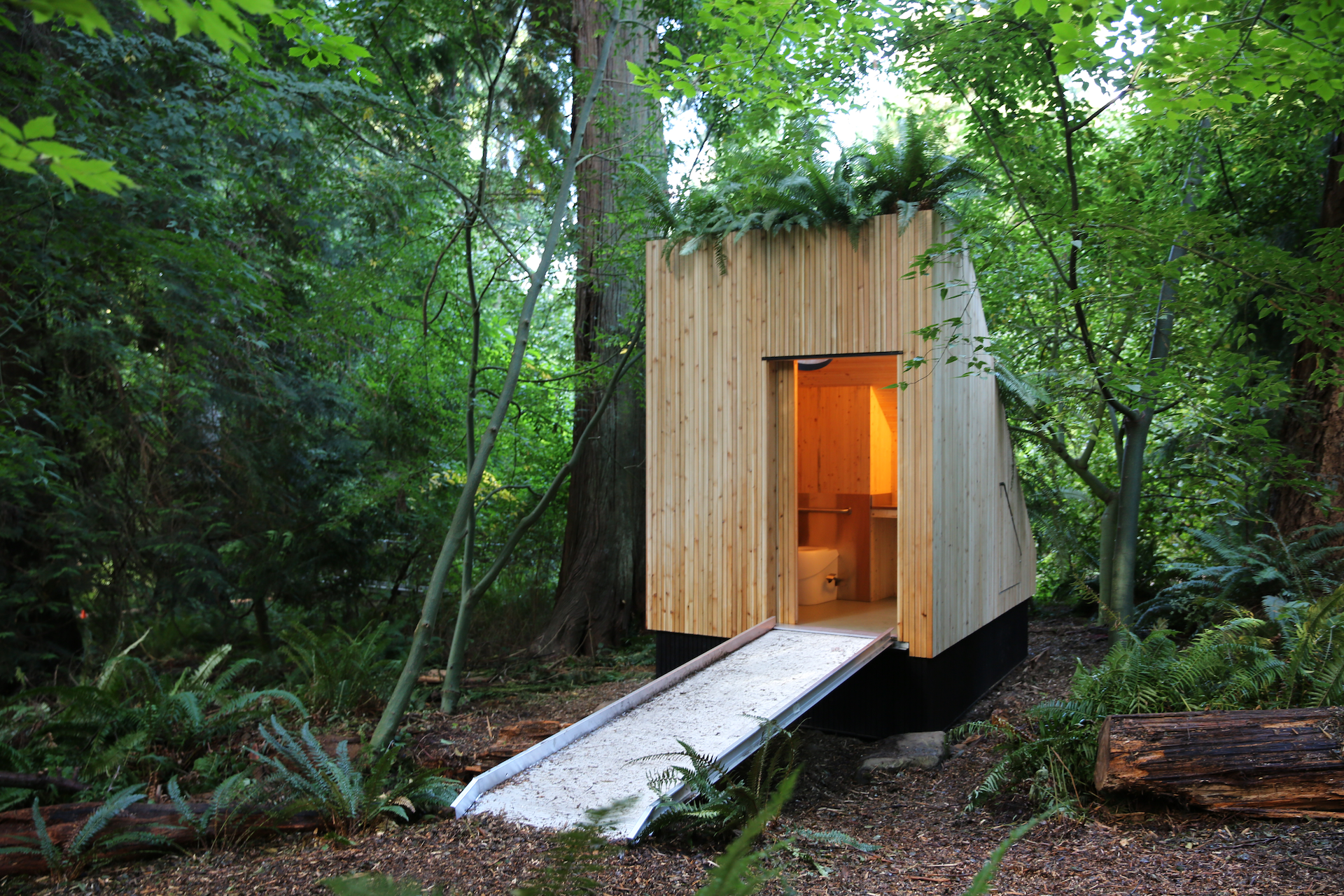Science
Innovative MycoToilet Design Aims to Transform Urban Sanitation

The MycoToilet project has unveiled an innovative prototype aimed at revolutionizing urban sanitation. Developed over several years, this modular toilet system was initially designed for use in refugee camps, addressing the urgent need for hygienic waste management solutions.
Architectural Design and Features
The MycoToilet features a distinctive wedge-shaped design, strategically situated within a grove of mature Douglas fir trees near the entrance of the UBC Botanical Garden tree walk in Vancouver, Canada. Visitors are guided to the facility through a gently sloping ramp that weaves through a lush, fern-filled landscape. Upon entering, they experience a bright and airy interior, enhanced by natural light streaming through a skylight integrated into the planted roof.
The use of timber and stainless steel finishes creates a modern aesthetic, setting it apart from traditional composting toilets, which often have a more rustic appearance. Prefabricated cross-dowel timber panels are manufactured by BC Passive House, a company based in Penticton, B.C., known for its mass timber and light framing prefabrication. Plumbing services have been provided by TyAx Plumbing & Heating, ensuring that the MycoToilet operates efficiently and effectively.
Addressing Urban Waste Challenges
According to Prof. Dahmen, a leading figure in the project, the MycoToilet represents a significant innovation in waste management. “What’s novel about this project is that it’s a modular, common-sense solution to a widespread problem. Traditional chemical toilets smell unpleasant and convert a valuable resource into toxic waste,” he remarked. “We’ve wrapped the whole system into an architecturally compelling package that’s a pleasant experience that smells good, looks good, and works seamlessly. It’s something a municipal government could order and have installed and operational immediately.”
The MycoToilet project aims not only to provide a functional alternative to conventional toilets but also to reshape the way urban environments manage human waste. “The purpose of building this was to demonstrate a truly modular technology. More than just another technical solution, it’s a complete rethinking of how we handle human waste in urban environments,” Prof. Dahmen added.
The initiative reflects a growing recognition of the need for sustainable sanitation solutions, particularly in densely populated areas where traditional waste management systems may fall short. By integrating modern design with practical functionality, the MycoToilet has the potential to significantly improve the hygiene and aesthetic of public spaces.
The prototype stands as a testament to the collaborative efforts of architects, engineers, and environmental experts, all working towards a common goal: to create a cleaner, more sustainable future for urban sanitation.
-

 Education3 months ago
Education3 months agoBrandon University’s Failed $5 Million Project Sparks Oversight Review
-

 Science4 months ago
Science4 months agoMicrosoft Confirms U.S. Law Overrules Canadian Data Sovereignty
-

 Lifestyle3 months ago
Lifestyle3 months agoWinnipeg Celebrates Culinary Creativity During Le Burger Week 2025
-

 Health4 months ago
Health4 months agoMontreal’s Groupe Marcelle Leads Canadian Cosmetic Industry Growth
-

 Science4 months ago
Science4 months agoTech Innovator Amandipp Singh Transforms Hiring for Disabled
-

 Technology3 months ago
Technology3 months agoDragon Ball: Sparking! Zero Launching on Switch and Switch 2 This November
-

 Education3 months ago
Education3 months agoRed River College Launches New Programs to Address Industry Needs
-

 Technology4 months ago
Technology4 months agoGoogle Pixel 10 Pro Fold Specs Unveiled Ahead of Launch
-

 Business3 months ago
Business3 months agoRocket Lab Reports Strong Q2 2025 Revenue Growth and Future Plans
-

 Technology2 months ago
Technology2 months agoDiscord Faces Serious Security Breach Affecting Millions
-

 Education3 months ago
Education3 months agoAlberta Teachers’ Strike: Potential Impacts on Students and Families
-

 Science3 months ago
Science3 months agoChina’s Wukong Spacesuit Sets New Standard for AI in Space
-

 Education3 months ago
Education3 months agoNew SĆIȺNEW̱ SṮEȽIṮḴEȽ Elementary Opens in Langford for 2025/2026 Year
-

 Technology4 months ago
Technology4 months agoWorld of Warcraft Players Buzz Over 19-Quest Bee Challenge
-

 Business4 months ago
Business4 months agoNew Estimates Reveal ChatGPT-5 Energy Use Could Soar
-

 Business3 months ago
Business3 months agoDawson City Residents Rally Around Buy Canadian Movement
-

 Technology2 months ago
Technology2 months agoHuawei MatePad 12X Redefines Tablet Experience for Professionals
-

 Business3 months ago
Business3 months agoBNA Brewing to Open New Bowling Alley in Downtown Penticton
-

 Technology4 months ago
Technology4 months agoFuture Entertainment Launches DDoD with Gameplay Trailer Showcase
-

 Technology4 months ago
Technology4 months agoGlobal Launch of Ragnarok M: Classic Set for September 3, 2025
-

 Technology4 months ago
Technology4 months agoInnovative 140W GaN Travel Adapter Combines Power and Convenience
-

 Science4 months ago
Science4 months agoXi Labs Innovates with New AI Operating System Set for 2025 Launch
-

 Top Stories2 months ago
Top Stories2 months agoBlue Jays Shift José Berríos to Bullpen Ahead of Playoffs
-

 Technology4 months ago
Technology4 months agoNew IDR01 Smart Ring Offers Advanced Sports Tracking for $169










